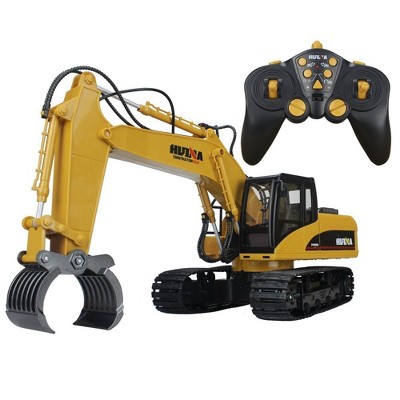Discover the Relevance of Excavator in Modern Building And Construction Projects
Excavators are crucial tools in modern construction projects. Their versatility permits them to perform a large range of tasks, from excavating and grading to demolition and website prep work. Advanced features, such as hydraulic attachments and GPS, enhance their abilities and effectiveness on work sites. As the sector evolves, the importance of excavators expands much more. Recognizing their duty can expose insights into the future of construction methods. What lies in advance for these devices?
The Flexibility of Excavators in Numerous Projects
Excavators are usually linked with massive building projects, their versatility enables them to be utilized in a wide array of applications, from domestic landscaping to energy maintenance. In city settings, excavators can browse limited spaces to dig foundations for homes or mount drainage systems. Their ability to do delicate jobs makes them optimal for landscape design jobs, where they can dig deep into for fish ponds or plant trees. Additionally, excavators play an important role in utility maintenance, efficiently excavating trenches for pipelines or cords without interrupting surrounding locations. In farming applications, they help in land clearing up and dirt prep work. Furthermore, their versatility enables them to be furnished with various accessories, enhancing their performance across different tasks. This complex nature of excavators not just simplifies different building and construction processes but also demonstrates their indispensable role in modern facilities advancement and upkeep.
Trick Features and Types of Excavators
The discussion on key features and sorts of excavators highlights the necessary features that make these makers invaluable in building. Different excavator kinds, each made for particular tasks, show their versatility and effectiveness throughout various applications. rc excavator. Recognizing these functions and categories is important for maximizing their use in modern-day building jobs
Excavator Enters Overview
Excavators play a pivotal role in modern construction, providing adaptability and efficiency throughout different tasks. These heavy machinery devices can be found in numerous types, each customized for details applications. The most common kinds include crawler excavators, understood for their stability on irregular terrain, and rolled excavators, which provide greater flexibility on paved surfaces. Tiny excavators are preferred for small-scale jobs and limited areas, while long-reach excavators are designed for deep excavating. In addition, there are specific excavators, such as hydraulic excavators, which boost power and precision. Each type features special capacities, making them crucial for jobs varying from digging and grading to demolition and product handling. Understanding these variations enables building and construction specialists to choose the right excavator for their job needs.
Key Features Explained
Understanding the crucial functions of excavators boosts their reliable application in building tasks. Excavators are characterized by their effective hydraulic systems, which offer the required force for excavating, lifting, and moving products. Their verbalized arms enable a wide variety of motion, promoting precise operations in restricted areas. Additionally, the range of attachments, such as pails, grapples, and augers, broadens their flexibility to meet various task needs. The size and weight of excavators additionally add to their security and ability to move on different terrains. Improvements in innovation have led to the integration of General practitioner and automation, improving accuracy and efficiency in excavation tasks. These functions jointly place excavators as essential devices in modern-day construction.
Applications in Building and construction
Changing building and construction websites, excavators play a crucial function throughout different applications, ranging from residential structure tasks to large framework growths. These functional devices are geared up for tasks such as excavating structures, trenching for energies, and site grading. Various types of excavators, including crawler, wheeled, and mini excavators, supply particular advantages customized to the task needs. Spider excavators stand out in harsh terrains, while wheeled excavators offer movement on paved surface areas. Miniature excavators are ideal for constrained areas, making them prominent in metropolitan setups. The effectiveness and power of excavators substantially quicken construction procedures, ensuring timely task completion. Their versatility better boosts their value, permitting building and construction groups to tackle a diverse range of challenges successfully.
Enhancing Performance and Efficiency on Job Sites
Taking full advantage of performance and productivity on work websites is a critical goal in modern building. Excavators play an essential duty in achieving this goal by streamlining various tasks. Their ability to carry out numerous functions-- such as training, grading, and excavating-- minimizes the demand for added equipment, consequently conserving time and resources.Moreover, excavators boost operations by permitting faster completion of tasks. With innovative attributes like hydraulic attachments and GPS technology, they can perform accurate procedures that lessen errors and remodel. This accuracy not only boosts the top quality of work yet also maximizes material use, adding to set you back savings.The convenience of excavators enables them to adapt to various site problems, ensuring that jobs progress efficiently no matter of difficulties. By integrating excavators right into building processes, teams can substantially increase their general efficiency, bring about prompt task conclusion and raised profitability.
Safety And Security Benefits of Using Excavators
Excavators substantially enhance security on construction websites through boosted driver visibility and reduced manual labor threats. By offering operators with a clear view of their surroundings, excavators help to avoid crashes and injuries. Additionally, the equipment reduces the requirement for workers to engage in dangerous hands-on tasks, better advertising a safer work environment.
Enhanced Driver Exposure
Building sites can be chaotic and filled with potential hazards, boosted operator visibility plays a crucial role in guaranteeing safety and security when making use of excavators. Modern excavators are developed with large, unblocked windows and strategically put mirrors, permitting drivers to keep a clear sight of their surroundings (rc excavator). This improved exposure is vital for spotting pedestrians, various other machinery, and numerous barriers, substantially minimizing the threat of crashes. Furthermore, many excavators include sophisticated innovation, such as sensors and electronic cameras, to give operators with additional viewpoints, further enhancing recognition. The capacity to see even more clearly not just aids in effective operation however additionally promotes a more secure job atmosphere, making it much easier for drivers to browse intricate construction sites without endangering security requirements
Minimized Manual Work Threats
When manual work is minimized via making use of excavators, various security advantages arise, noticeably enhancing the wellness of building and construction workers. Excavators minimize the physical stress connected with heavy training and repetitive tasks, effectively decreasing the risk of bone and joint injuries. By automating procedures such as excavating, grading, and moving materials, they allow employees to keep a more secure range from possible risks. Additionally, excavators are furnished with innovative safety functions, such as rollover protection systems and improved driver ergonomics, which further guard employees on website. The outcome is a considerable decrease in office accidents and injuries, resulting in raised performance and spirits among building and construction groups. Inevitably, the adoption of excavators adds to a safer and more efficient building and construction atmosphere.
Excavators in Earthmoving and Site Preparation
In contemporary construction, a substantial portion of earthmoving and website preparation tasks depends on the performance and convenience of excavators. These machines are created to handle various dirt types and terrain, making them important for grading, digging, and trenching tasks. Their hydraulic arms can be equipped with various add-ons, such as buckets and augers, allowing drivers to personalize their strategy based on particular task requirements.Excavators stand out at moving big quantities of planet promptly and efficiently, which increases the overall construction timeline. They can navigate tight rooms and challenging sites where traditional tools might have a hard time, boosting productivity. Additionally, the accuracy of excavators warranties that site prep work adheres to stringent specifications, reducing the risk of errors that could bring about costly rework.
The Duty of Excavators in Demolition Tasks
Excavators play additional resources an essential function in demolition jobs, as they possess the power and dexterity required to dismantle structures successfully. Equipped with various accessories such as hydraulic breakers, shears, and grapples, these equipments can adjust to different demolition needs, whether for little structures or big commercial sites. Their convenience makes it possible for operators to tackle complex jobs while preserving safety and precision.In addition to their demolition capabilities, excavators facilitate debris elimination, guaranteeing that job sites remain well organized and safe. By breaking down frameworks right into convenient items, they permit streamlined clearing up and recycling of materials, aligning with modern-day sustainability efforts.Moreover, excavators can access limited areas and navigate uneven surface, making them crucial in city demolition tasks. On the whole, their robust design and multifunctionality make excavators an essential asset in the demolition phase of building and construction, adding considerably to job timelines and performance.


Future Patterns in Excavator Innovation and Use
As the building market develops, developments in excavator technology are positioned to change their usage and efficiency markedly. One considerable trend is the assimilation of automation and fabricated knowledge, enabling excavators to run with marginal human intervention. This shift will certainly enhance accuracy in jobs such as grading and trenching, decreasing human error and enhancing productivity.Additionally, the surge of hybrid and electric excavators is forming an extra lasting building and construction environment, lowering carbon exhausts and gas prices. Improved telematics systems are also arising, enabling real-time monitoring of device efficiency and upkeep needs, which can result in far better operational performance and longer tools lifespan.Moreover, advancements in accessory innovation are broadening the adaptability of excavators, permitting them to carry out a wider variety of tasks. The mix of these fads demonstrates a future where excavators are smarter, greener, and more versatile, eventually reshaping building job dynamics.
Frequently Asked Inquiries
Just How Do Excavators Contrast to Other Building Equipment?
Excavators, identified by their adaptability and power, excel in digging and earthmoving compared to various other machinery. Their capacity to do various jobs, consisting of training and demolition, makes them vital in building and construction projects, improving overall effectiveness.

What Is the Typical Life-span of an Excavator?
The ordinary lifespan of an excavator typically varies from 7,000 to 10,000 operating hours, relying on upkeep, use conditions, and model. Appropriate treatment can prolong this lifespan, making sure peak efficiency throughout its functional years.
Just How Are Excavators Preserved for Optimal Efficiency?
Excavators need normal maintenance for peak performance, including routine examinations, liquid checks, filter replacements, and timely repair services. Applying a preventive maintenance schedule assists extend their lifespan and warranties more effective operation in various building environments.
What Are the Prices Connected With Getting an excavator vs. renting out?
The prices associated with getting an excavator versus renting out differ substantially. Renting offers reduced upfront costs however can collect with time, while purchasing calls for a considerable initial financial investment, but click for more info supplies lasting cost savings and asset ownership advantages.
What Training Is Called For to Operate an Excavator?
Operating an excavator requires specialized training, typically including security protocols, maker operation methods, and ecological awareness. Accreditation programs commonly mandate sensible experience, making it possible for operators to handle various tasks successfully while making sure conformity with industry policies. The most usual kinds include crawler excavators, understood for their security on unequal surface, and rolled excavators, which supply better flexibility on paved surfaces. Tiny excavators are favored for small-scale projects and limited spaces, while long-reach excavators are made for deep digging. Additionally, there are specific excavators, such as hydraulic excavators, which improve power and precision. Different types of excavators, consisting of spider, rolled, and mini excavators, offer specific benefits customized to the task requirements. Crawler excavators stand out in rough terrains, while rolled excavators provide flexibility on paved surface areas.